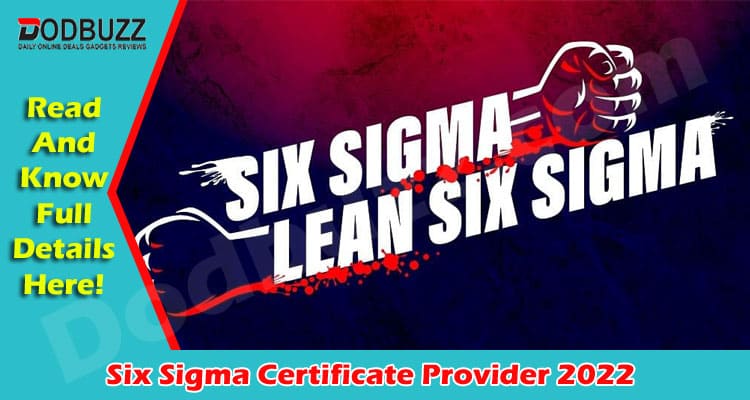Six Sigma Certificate Provider: Are you planning to enroll in a business management program? If so, then having a Six Sigma certificate is a good indicator that you have completed the requirements of a training program, and it makes sense to ask specific questions before you enroll. Once enrolled, your best bet will be to follow the clear guidelines laid out in the course material.
Before You Enroll
If you are thinking about enrolling for a Six Sigma certification, you should ask the following questions.
What are Your Learning Objectives?
Before you enroll in the program, it is essential to verify that your organization’s learning objectives make sense. The proper outcomes from a training course will depend on the industry and business function they are implemented in.
Two widely used Six Sigma certification programs are the Green Belt Program and Black Belt Program – each with different objectives. For example, the primary purpose of the Green Belt is to facilitate process improvements, while Black Belts are responsible for making significant changes (and staying within budget).
Which Version of Six Sigma Does Your Provider Follow?
According to reports, the top three business intelligence trends are data visualization, data quality management, and self-service business intelligence.
Six Sigma has evolved, and so has its certification program. Motorola popularized the original 6σ initiatives in 1986, and the DMAIC (Define, Measure, Analyze, Improve, and Control) process has been a central part of all certification programs.
However, several other methods have emerged over time, such as Lean Six Sigma and Design for the Program, focusing on different aspects.
What is the Cost of the Program, and Does It Include Books, Exam Fees, and Certification?
The cost can vary significantly with Six Sigma courses depending on your location and the provider. Look for a course with in-depth content that provides materials such as books, workbooks, or software to help your studies. You should also check if the cost covers the exam fees and certification.
What are Your Plans to Stay Relevant?
As mentioned earlier, the Program has evolved to be known as Lean Six Sigma or Design for Six Sigma – both of which look at different aspects of process improvement. Ask your provider how they plan to stay relevant in the phase of this growth.
How Long Does It Take to Complete the Program?
Look for a course that can be completed within six months or less since you need to study and pass the exams. Courses that take longer than expected may not give you enough flexibility to complete in your spare time.
What Kind of Exam Do You Have and How is It Scored?
The exam may be a timed test or scored based on consistent performance. Some certification providers have exams, while others accept exams from accredited providers such as ASQ or Prometric.
In either case, try to find out the test format and how it is scored. It will help you understand the preparation and practice required before you sit for the exam.
What are Your Support and Career Assistance Plans?
Look for a course that provides support to students through email or phone and access to career assistance such as resume review and interview guidance.
Six Sigma can help your career growth and help you get recognition within the organization, so look for a course that can help you achieve these goals.
Can You Provide References?
As with any course, it is best to ask for references from people you know who have gone through the program and learn about their experience first-hand.
It will help you learn more about the course and make an informed decision.
When you get references, see if they have questions you can ask to understand their experience with the course better.
It will help you have a more informed decision when choosing your Six Sigma training provider.
How Can You Earn Continuing Education Units (CEUs)?
As a professional, you may already be earning credits by participating in seminars or conferences. Look for a provider that can award CEUs so you can seamlessly accumulate them and maintain your credentials.
What are Your Course Outlines?
Course outlines the layout topics covered and the time allocated for each topic. It helps you understand how your course is structured and matches your expectations.
What is Your Cancellation Policy?
Most certification providers offer a refund if you cancel the course more than two weeks before the scheduled start date but check with them about their cancellation policy to avoid unpleasant surprises later.
You can also ask for discounts on the total cost if you are a corporate group or a group of five people or more.
What are Your Payment Options?
Look for a provider that offers payment options such as monthly installments to help you complete the course over time instead of one hefty upfront fee.







